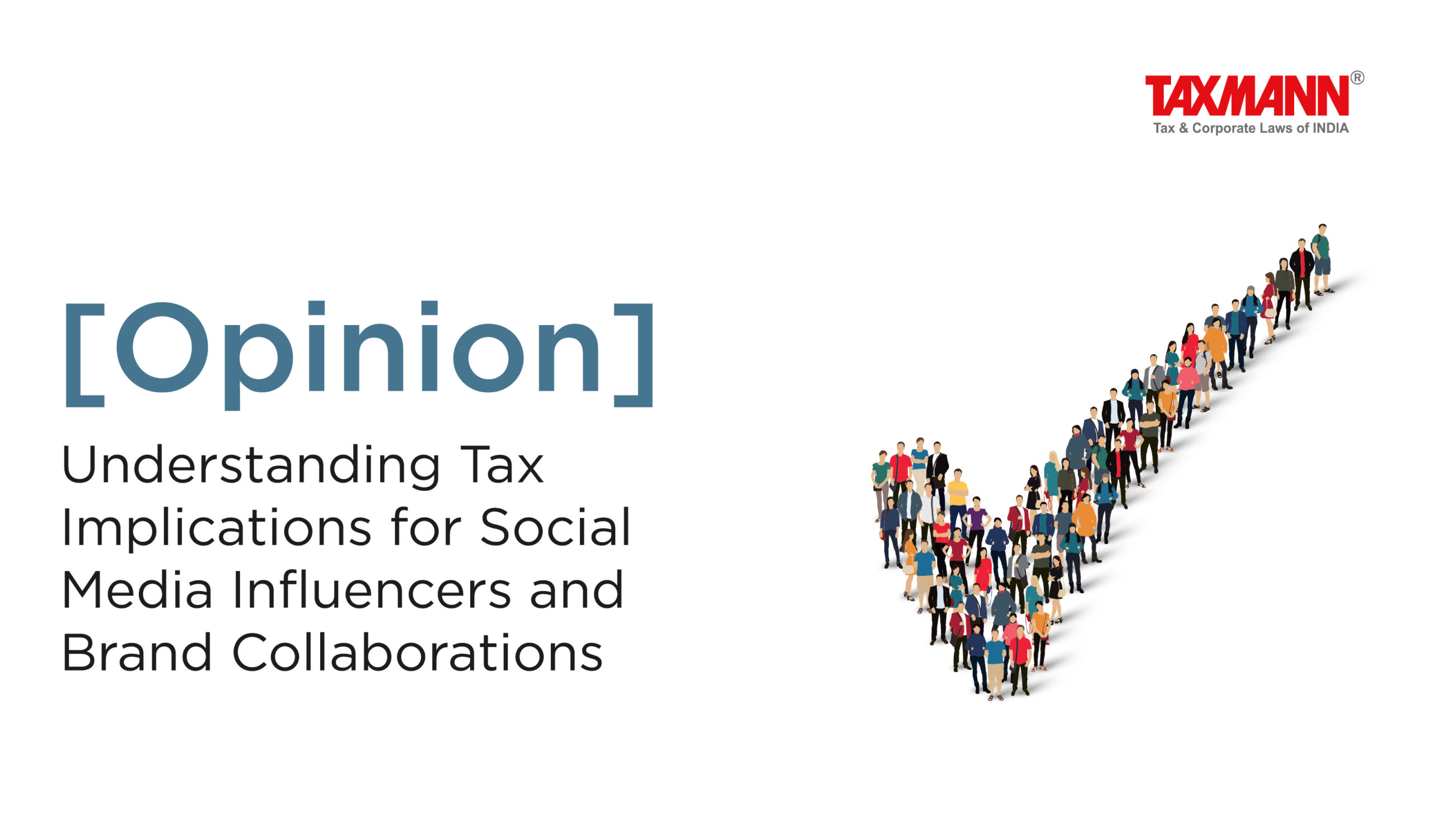[Opinion] Understanding Tax Implications for Social Media Influencers and Brand Collaborations
- News|Blog|Income Tax|
- 2 Min Read
- By Taxmann
- |
- Last Updated on 4 September, 2023

CA Rahul Singh & CA Manila Mehta – [2023] 152 taxmann.com 520 (Article)
1. Introduction
Influencer marketing is a term we often hear, but what exactly is it? It is a form of marketing that involves collaborating with “social media influencers” to promote products or services on social media.
Social Media Influencers have emerged as influential individuals who can shape consumer behaviour and influence their purchasing decisions. These individuals leverage their online presence and large followings to promote brands, products, and services, and in return, they earn substantial incomes.
In recent times, India has experienced a remarkable shift in its digital and social media landscape. Initially introduced as a means to stay connected with friends and family, Social Media has evolved into a powerful tool for staying informed about current affairs, trends, new products and services.
A decade ago, influencer marketing was confined primarily to celebrities. Today, social media influencers have proliferated and saturated the market. YouTube, Instagram, Facebook, Twitter, and other social media platforms have opened up countless opportunities for influencers to endorse products and services spanning fashion, cosmetics, lifestyle, travel, and tourism.
Unsurprisingly, you may have subscribed to numerous YouTubers who offer distinctive life lessons, book or movie reviews, business case studies, and many more.
With the global growth of influencer marketing, India is experiencing swift momentum in this emerging sector. In 2022, marketing expenditure on influencers in the third-largest Asian economy reached approximately $400 million, and experts project that it could escalate to $8 Billons by 20301.
This article aims to shed light on the taxation landscape for Influencers deriving income through social media platforms.
2. Scope of income, chargeability and deductions
Influencers generate substantial income through collaborations, brand partnerships, endorsements, and sponsored content. Collaboration or brand partnership involves a mutually beneficial relationship between an influencer and a brand.
The nature of collaborations and brand partnerships can vary widely. It can involve sponsored content, where influencers promote a brand’s product or service in exchange for compensation. It can also entail long-term ambassadorships, where influencers become the face of a brand, representing it over an extended period. Influencer marketing is part of the brand’s overall social media marketing strategy.
They promote products/services by sharing purchase links or discount coupons. Influencers earn a part of the revenue as a reward when someone buys a product using their link or coupon. Influencers may also receive products from companies for which they are doing promotions. In most cases, the companies do not take back these products after the end of the promotion.
Plus, influencers also monetize their content through ad placements on platforms like YouTube or through ad networks on blogs and websites and get a share of ad revenue from social media platforms.
All these income earned by influencers, including the value of products retained by them, are taxable under the Income-tax Act 1961.
Click Here To Read The Full Article
Disclaimer: The content/information published on the website is only for general information of the user and shall not be construed as legal advice. While the Taxmann has exercised reasonable efforts to ensure the veracity of information/content published, Taxmann shall be under no liability in any manner whatsoever for incorrect information, if any.

Taxmann Publications has a dedicated in-house Research & Editorial Team. This team consists of a team of Chartered Accountants, Company Secretaries, and Lawyers. This team works under the guidance and supervision of editor-in-chief Mr Rakesh Bhargava.
The Research and Editorial Team is responsible for developing reliable and accurate content for the readers. The team follows the six-sigma approach to achieve the benchmark of zero error in its publications and research platforms. The team ensures that the following publication guidelines are thoroughly followed while developing the content:
- The statutory material is obtained only from the authorized and reliable sources
- All the latest developments in the judicial and legislative fields are covered
- Prepare the analytical write-ups on current, controversial, and important issues to help the readers to understand the concept and its implications
- Every content published by Taxmann is complete, accurate and lucid
- All evidence-based statements are supported with proper reference to Section, Circular No., Notification No. or citations
- The golden rules of grammar, style and consistency are thoroughly followed
- Font and size that’s easy to read and remain consistent across all imprint and digital publications are applied



 CA | CS | CMA
CA | CS | CMA
